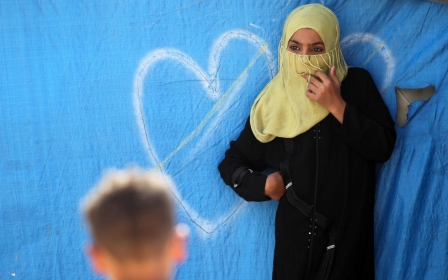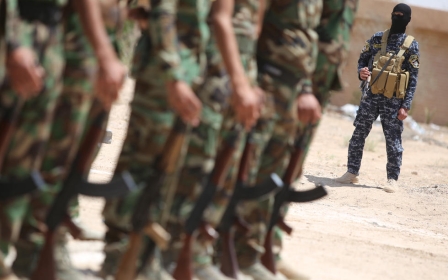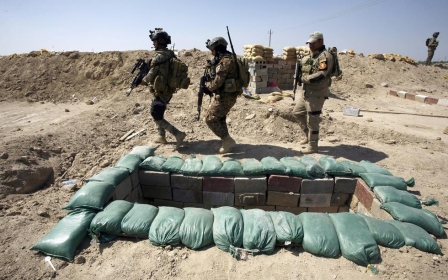At least 73 killed by Iraqi government attacks in Anbar province

At least 73 people have been killed by Iraqi army attacks in Anbar province, including 50 killed in an airstrike on a sports field in Ramadi, shortly after midnight on Sunday.
23 people were also killed and 40 wounded in shelling north of Fallujah, local sources told Al-Jazeera.
According to hospital officials, most of the dead were young civilian men, but this was denied by the Iraqi army who said they had targeted member of the Islamic State (IS) group.
"In this latest attack we're told that young men had gathered after breaking the day's fast to play traditional games including soccer," Al-Jazeera's Jane Arraf reported.
"We're also told by local sources that they were joined by members of ISIL, trying to recruit some of them, and that's when they air strikes happened," she added, using an alternative acronym for IS.
Locals also reported the use of barrel bombs by the Iraqi airforce, which are prohibited under international law.
The Iraqi government launched an operation to retake Ramadi in May, following its fall to IS.
Both the Iraqi army and members of the paramilitary Popular Mobilisation Units (PMUs) – also known as Hashd – have been involved in fighting in and around the city, with 30 PMU fighters reportedly killed on Sunday.
Unauthorised withdrawal
Last Saturday, Prime Minister Haider al-Abadi condemned the original retreat of forces from Ramadi as “unauthorised.”
"The withdrawal of the forces from Ramadi was unauthorised - the orders were the opposite. The forces had to resist, and if they had resisted, we would not have lost Ramadi," Abadi said, speaking at a televised ceremony in Baghdad.
Many have been critical of the presence of the PMUs in retaking Ramadi, as they have been accused of engaging in anti-Sunni sectarianism.
The original operation to recapture the city was named “We Obey You, O Hussein” – a reference o the Prophet Muhammad's second cousin, venerated by Shias – by the PMUs, though they changed it to “We Obey You, O Iraq” after pressure from the government.
Commentators have suggested that the overwheaning influence of the PMUs, as well as their popularity, could make it difficult for the central government to bring them back under control.
“Abadi’s key challenge now is to try and find a way to bring militia leaders in line, something which may only be possible once they have suffered an unmistakable defeat in an offensive they are leading,” wrote Kirk H. Sowell, a political risk analyst based in Amman, Jordan.
“Over the long term, Abadi’s power of the purse—being able to decide which militias get money for salaries—could give him leverage, although Iranian support for its groups undermines this. So the irony for the Iraqi government is that with its forces so dependent on Hashd militia support, it may struggle to impose itself on the country unless they face military setbacks, and conversely, sustained Hashd success could undermine the process of state consolidation.”
The Iraqi government has been keen to stress that Sunnis have also been joining the PMUs and that the sectarian element is overplayed.
"It is psychological warfare against our people," Brigadier General Saad Maan Ibrahim, from Iraq's Joint Operations Command, told Middle East Eye. "Most people in Al-Karma [in Anbar] are Sunni and we have more than a thousand people from the tribes there that are fighting with us against Daesh [IS]."
"We are needing them [PMUs] for this period only. But next year the situation may change."
"I know that not all of them [PMUs] are angels," he added.
New MEE newsletter: Jerusalem Dispatch
Sign up to get the latest insights and analysis on Israel-Palestine, alongside Turkey Unpacked and other MEE newsletters
Middle East Eye delivers independent and unrivalled coverage and analysis of the Middle East, North Africa and beyond. To learn more about republishing this content and the associated fees, please fill out this form. More about MEE can be found here.




